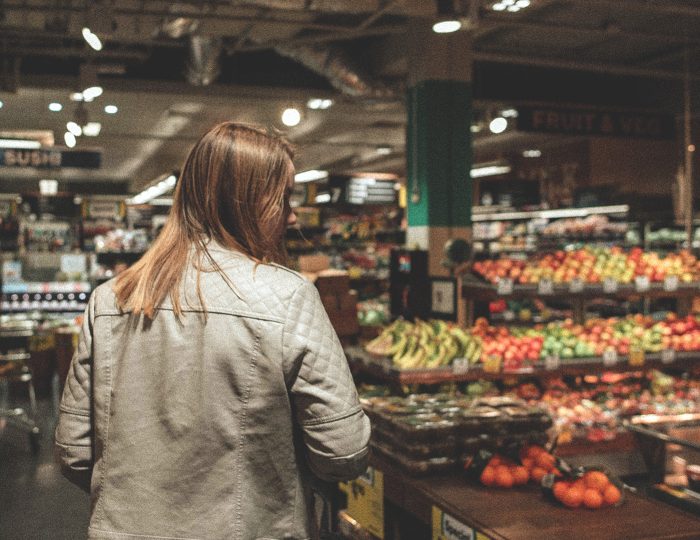I can remember the outrage in the 1970s and 80s, when it was revealed that various government interventions had resulted in foodstuffs being stockpiled in grain mountains, butter mountains, and milk lakes across the EU.
Now I hear that we’re facing the opposite: the British government is preparing for potential shortages of foods and medicines if they are unable to reach an agreement with the EU over Brexit.
Far too much, followed by far too little. Fat years followed by lean years.
Of course, for many in our nation, the lean years are already here:
‘In the financial year 2017-18, over 1.3 million three–day emergency food supply parcels were distributed by Trussell Trust food banks, representing a 13% increase on the previous year.’
Food shortages are a reality for many families in the UK, even while the supermarket shelves groan with abundance, and households waste over 4.4 million tonnes of edible food each year (as opposed to inedible food waste, such as chicken bones and egg shells).
As a snapshot of the brokenness of our world, our attitude to and distribution of food is a pretty graphic one.
Christ’s death and resurrection bring about a new creation, the restoration of peace and wholeness – what the Bible calls ‘shalom’ – to every area of life on this planet. We often relate that to moral flaws such as pride, drunkenness, or sexual sin. But what if we started to pursue shalom in the area of our ‘daily bread’?
Here are some questions to consider as we assess whether shalom is beginning to make it as far as our kitchens: Do I/my family eat for nutrition or for indulgence? Do we make time to appreciate our food, acknowledge its source, and enjoy the process of sharing a meal? Do we steward our excess well – whether that means freezing leftovers or inviting those in need to share in all God has blessed us with?
It is right that we are distressed when we see one nation hoarding grain while another starves, but we must be careful of holding governments to a higher standard than ourselves. Large-scale injustices need to be addressed, but Jesus had firm words for those who expected others to live righteously yet made excuses when it came to their own lives. Is God’s rule and reign – his shalom – as evident in our fridges as it is in the more public areas of our lives?
Jennie Pollock
Jennie is a freelance writer and editor who lives in London and worships at Grace London. She blogs at jenniepollock.com



Thank you.
Thanks Jennie. Great post.
Something else that we need to consider is the effect of income disparity on society and individuals. This was well set out by Richard Wilkinson and Kate Pickett in their book The Spirit Level. I understand their new book The Inner Level makes a similar case although I have not yet read it.
For Christians this should not come as a surprise. After all, the Bible has plenty to say about money and justice.
At a time of food stockpiling in Egypt, Joseph was able to help his brothers when there was famine in their land. What happened after that changed the course of history for God’s people.
Thanks Jennie.
How timely: “Earth Overshoot Day” fell on August 1st this year – i.e. last Wednesday. This marks the date each year when we have used more from nature than our planet can renew in the entire year. When Earth Overshoot Day was first calculated, in 2016, it fell in October…
(see: https://www.overshootday.org/about-earth-overshoot-day/)
Your post reminds us that big issues of justice and creation care are inextricably linked to the small choices we make about our daily bread.
Good post my father after living through depression in 1930 and after fighting in 2no world
War would never thought in 2018 we have food accommodation lack in this country interesting Norway put their oil wealth in a central fund so education including university is free health care is better and we are a rich country but we are riding on the backs of poor. The church needs to wake up
Well done in highlighting how much food is wasted each year. Those of us who grew up on rationing after WWII and often went hungry abhor food waste and the inequality of distribution where a good proportion of the world’s population is starving whilst others suffer a surfeit of plenty.
Well said. I believe it has everything to do with the intentionality we bring to the stewardship of every area of our lives for the kingdom of God, living the shalom we have experienced and giving others a taste of it. Thank you for your thoughts.
We are extremely wasteful as a result of a #supersizemesuvconsumerculture The media has a part to play on this not simply on advertising but on reportage that jumps from latest fad to fad, cherry picks scientific discoveries, skim reads those reports and regurgitates them inaccurately in lay terms.
We need to learn from our forebears who rebuilt Europe after ww2. Visit the recycling pioneers Finland to see a way forward. Bar code plastic bottle recycling at Lidl, 3 bins for different food waste in restaurants. They turn the inedible city and industrial waste into #hvo that runs as a diesel replacement fuel that massively reduces all emissions including NOx. It works in winter down to minus 40 deg C and gives higher miles per gallon. Helsinki buses run on it. #scrappingiswasteful We’ve seen from #vwgate how perfectly serviceable and efficient cars in their hundreds of thousands have been scrapped and replaced by energy guzzling SUVs in the USA. The same is now happening over here as new cars get bigger and heavier. Higher drag, increasing congestion, wear and tear on already narrow roads. As an electric car owner I can assure you EVs are not as green as the public are being told. We only need to visit the DRC Cobalt mining regions. Taking responsibility for (not just throwaway leasing) our goods and possessions seems to be in decline.
Thought provoking article – just picked it up after hearing your radio interview on UCB. I have a different angle on Shalom in the kitchen, which is about the not having to worry and enjoying what you eat. In my experience it is almost impossible to find people who both need and will accept the extra food that you will otherwise throw in the bin, which can happen for all sorts of reasons, including God’s very generous provision! I walked round our city for a few hours on the soup run the other week, handing out top end sandwiches from Pret-a-manger and even the homeless are so well catered for that you get a lot of people turning food down because you don’t have their favourite flavour, or as I heard so many times that night “I don’t like guacamole”. I went home and ate a huge amount of leftovers which we shared among the team. I’m not sure it’s any less wasteful to eat stuff I don’t need than throw it in the bin. It was tasty though 🙂